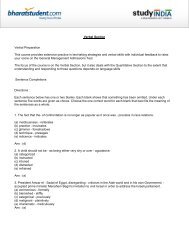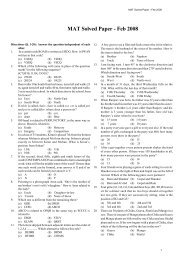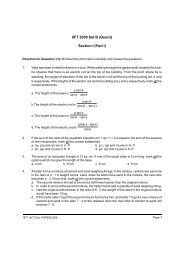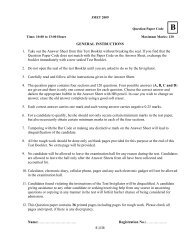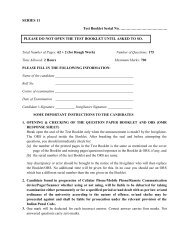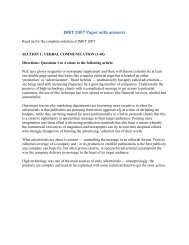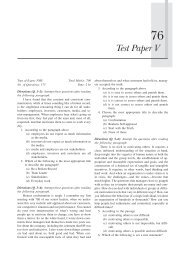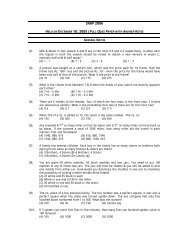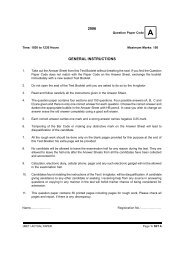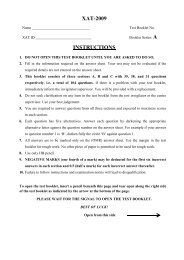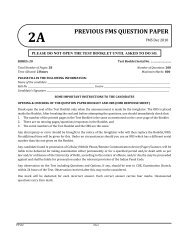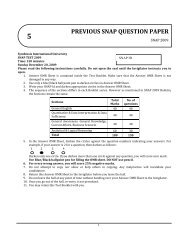PREVIOUS IIFT QUESTION PAPER
PREVIOUS IIFT QUESTION PAPER
PREVIOUS IIFT QUESTION PAPER
Create successful ePaper yourself
Turn your PDF publications into a flip-book with our unique Google optimized e-Paper software.
77. For summarizing the passage, which of the<br />
following is most appropriate:<br />
(1) The study explored how citizens’<br />
commitment to legal authorities changed as a<br />
function of their initial level of commitment<br />
and their perceptions of how fairly they were<br />
treated in their recent encounters with legal<br />
authorities.<br />
(2) The influence of individuals' prior<br />
commitment to an institution on their<br />
reactions to the perceived fairness of<br />
decisions rendered by the institution was<br />
examined.<br />
(3) Given the generally positive consequences to<br />
organizations of having committed<br />
employees, it may be that unfair managerial<br />
practices would begin to alienate the very<br />
employees that the organization would least<br />
wish to alienate.<br />
(4) The passage aims at understanding how<br />
people define happiness and these<br />
definitions include instrumental view-points.<br />
Passage - 4<br />
In the annals of investing, Warren Buffett stands<br />
alone. Starting from scratch, simply by picking stocks<br />
and companies for investment, Buffett amassed one of<br />
the epochal fortunes of the twentieth century. Over a<br />
period of four decades more than enough to iron out<br />
the effects of fortuitous rolls of the dice, Buffett<br />
outperformed the stock market, by a stunning margin<br />
and without taking undue risks or suffering a single<br />
losing year. Buffett did this in markets bullish and<br />
bearish and through economies fat and lean, from the<br />
Eisenhower years to Bill Clinton, from the l950s to the<br />
l990s, from saddle shoes and Vietnam to junk bonds<br />
and the information age. Over the broad sweep of<br />
postwar America, as the major stock averages<br />
advanced by 11 percent or so a year, Buffett racked<br />
up a compounded annual gain of 29.2 percent. The<br />
uniqueness of this achievement is more significant in<br />
that it was the fruit of old-fashioned, long-term<br />
investing. Wall Street’s modern financiers got rich by<br />
exploiting their control of the public's money: their<br />
essential trick was to take in and sell out the public at<br />
<strong>IIFT</strong> 2010<br />
opportune moments. Buffett shunned this game, as<br />
well as the more venal excesses for which Wall Street<br />
is deservedly famous. In effect, he rediscovered the<br />
art of pure capitalism, a cold-blooded sport, but a fair<br />
one. Buffett began his career, working out his study in<br />
Omaha in 1956. His grasp of simple verities gave rise<br />
to a drama that would recur throughout his life. Long<br />
before those pilgrimages to Omaha, long before<br />
Buffett had a record, he would stand in a comer at<br />
college parties, baby-faced and bright-eyed, holding<br />
forth on the universe as a dozen or two of his older,<br />
drunken fraternity brothers crowded around. A few<br />
years later, when these friends had metamorphosed<br />
into young associates starting out on Wall Street, the<br />
ritual was the same. Buffett, the youngest of the<br />
group, would plop himself in a big, broad club chair<br />
and expound on finance while the others sat at his<br />
feet. On Wall Street, his homespun manner made him<br />
a cult figure. Where finance was so forbiddingly<br />
complex, Buffett could explain it like a general-store<br />
clerk discussing the weather. He never forgot that<br />
underneath each stock and bond, no matter how<br />
arcane, there lay a tangible, ordinary business.<br />
Beneath the jargon of Wall Street, he seemed to<br />
unearth a street from small-town America. In such a<br />
complex age, what was stunning about Buffett was his<br />
applicability. Most of what Buffett did was imitable by<br />
the average person (this is why the multitudes<br />
flocked to Omaha). It is curious irony that as more<br />
Americans acquired an interest in investing, Wall<br />
Street became more complex and more forbidding<br />
than ever. Buffett was born in the midst of<br />
depression. The depression cast a long shadow on<br />
Americans, but the post war prosperity eclipsed it.<br />
Unlike the modern portfolio manager, whose mindset<br />
is that of a trader, Buffett risked his capital on the<br />
long term growth of a few select businesses. In this,<br />
he resembled the magnates of a previous age, such as<br />
J P Morgan Sr.<br />
As Jack Newfield wrote of Robert Kennedy, Buffett<br />
was not a hero, only a hope; not a myth, only a man.<br />
Despite his broad wit, he was strangely stunted.<br />
When he went to Paris, his only reaction was that he<br />
had no interest in sight-seeing and that the food was<br />
better in Omaha. His talent sprang from his unrivaled<br />
independence of mind and ability to focus on his



